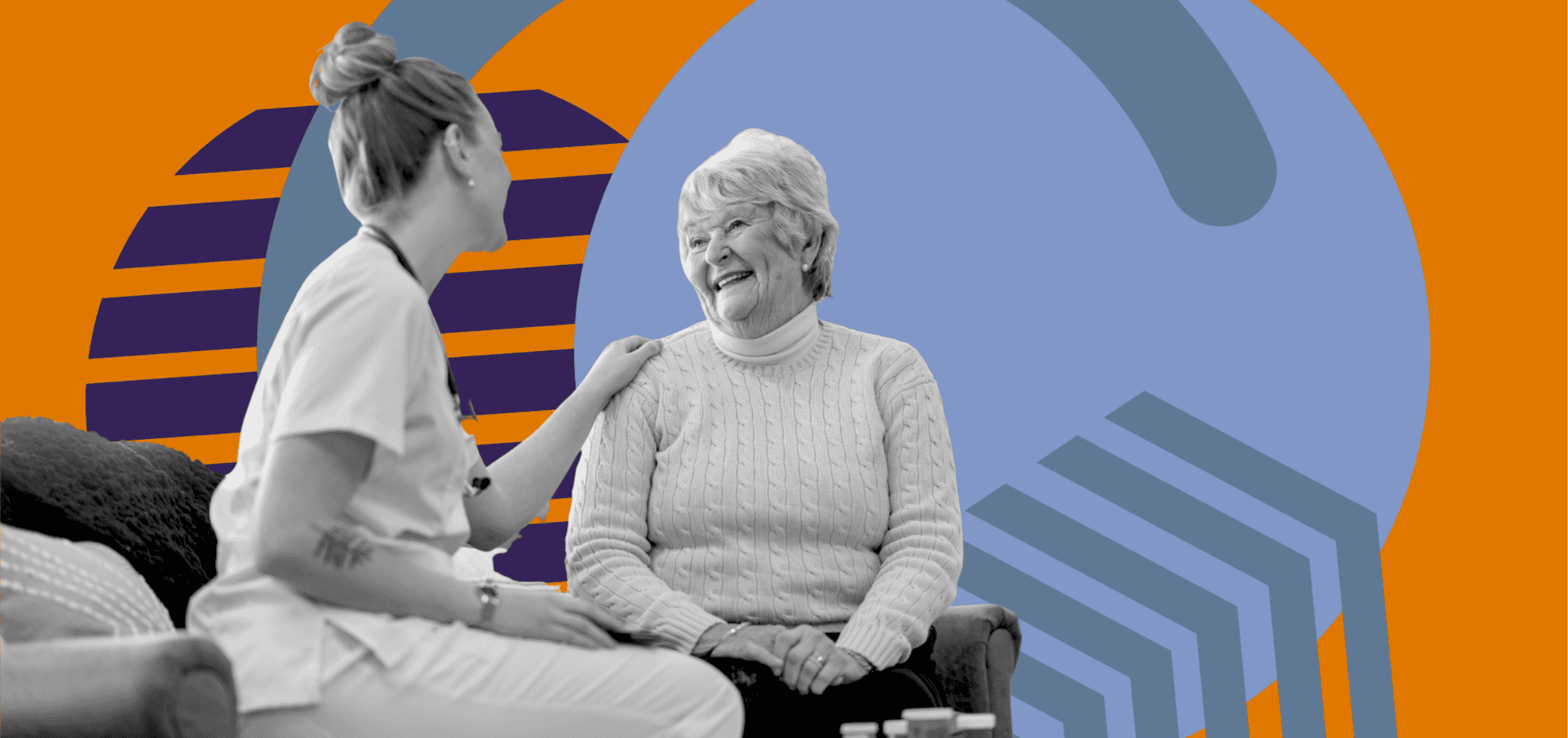
If you'd like to listen to this article instead, our co-founder Mariam Treystman breaks it all down in the podcast below.
If you’re running a hospice agency, you may be struggling to recruit and manage volunteers to stay compliant with Medicare regulations. With increasing demands from CMS and the challenge of finding dedicated volunteers, agencies can feel frustrated with this requirement.
Many people don’t know that hospice care is deeply rooted in volunteerism. The modern hospice movement began in the 1960s with volunteers providing comfort to terminally ill patients. By the late 1980s, hospice care became part of Medicare making it a funded program. However, to keep the original spirit of hospice alive, CMS formalized the requirement for volunteer participation.
At The Home Health Consultant, we specialize in helping agencies stay compliant with Medicare Conditions of Participation (CoPs). With decades of experience, we’ve seen how a well-structured volunteer program can reduce costs, improve patient care, and enhance family support.
In this article, we’ll break down everything you need to know about hospice volunteers, including:
- Why volunteers are required and their impact on care
- Medicare compliance requirements for hospice volunteer training
- Medicare expectations for recruiting & maintaining hospice volunteers
- If there is an age limit for hospice volunteers
- Medicare requirements for tracking hospice volunteer hours
-
Medicare rules around notifying hospice patients of volunteers & care planning
- What to know about hospice volunteer coordinators
- Tips to help you find & keep dedicated hospice volunteers
- The best strategies for ensuring your volunteer program meets all CMS guidelines
By the end of this article, you'll be able to confirm your volunteer program is in great shape or make improvements if needed.
Why Are Hospice Volunteers Required?
Volunteers are a required part of Medicare-certified hospice programs. The Centers for Medicare and Medicaid Services (CMS) mandates that at least 5% of total patient care hours be provided by volunteers. This ensures the original spirit of hospice (community-driven support) remains intact.
If your agency does not follow the volunteer related CMS Conditions of Participation (CoPs), your agency will fail survey.
Hospice volunteers provide non-clinical services that enhance patient and family experiences. Their contributions range from direct companionship to administrative assistance. Hospice volunteers can engage in:
- Direct Companionship: Visiting and spending time with patients in hospice
- Bereavement Support: Offering comfort to grieving families
- Specialized Services: Providing non-clinical services such as pet therapy or veteran support programs
- Administrative Assistance: Helping the hospice agency in-office with anything from errands, to organization, and more
For a more detailed look at what hospice volunteers can do, take a look below.
Patient Related Activities:
- Visiting the patient
- Calling and talking with the patient
- Transporting the patient/family/supplies
Bereavement Activities:
- Acting as a bereavement contact for the family
- Helping organize the funeral service
- Making/delivering food for the family
- Organizing an annual memorial service
Indirect Volunteer Activities:
- Attending volunteer training
- Participating in monthly volunteer meetings
- Attending hospice in-services
- Attending teleconferences
- Attending educational workshops
- Recruiting other volunteers
Office Volunteer Activities:
- Clerical work
- Office work for the volunteer program
- Office work for the bereavement program
- Office work for nursing
- Educating the community
- Educating hospice staff
- Making comfort care carts
Miscellaneous Activities:
- Refreshments for functions
- Computer/tech support
- Acknowledgments
- Health Fairs
- Board of Directors (BOD)/Committee Meetings
The presence of volunteers reduces costs while improving care quality. Volunteers help families feel supported, especially during difficult times. Their impact extends beyond patients, reinforcing hospice’s mission of dignity and compassion. They can also relieve some pressure from an understaffed office.
What Are the Medicare Requirements for Hospice Volunteer Training?

CMS has strict guidelines to ensure hospice volunteers are well-integrated into care programs. Hospices must provide documented training for all volunteers.
While CMS does not specify the number of hours, training must align with hospice industry standards. Some accrediting bodies require structured training programs, so be sure to check with your accreditor. Volunteers working with patients or handling sensitive information must undergo background checks within three months of onboarding.
Additionally, hospice volunteers are required to be well trained in HIPAA before directly interacting with patients or sensitive information.
What Are the Medicare Requirements for Hospice Volunteer Recruitment and Retention?
Surveyors will ask how your agency recruits and retains volunteers. Agencies should document recruitment strategies and maintain detailed logs of volunteer contributions. Common sources of volunteers include:
- community groups
- faith-based organizations
- and educational institutions.
Retention is just as important as recruitment. Volunteers must feel valued and supported. Many agencies hold recognition events or offer structured volunteer programs with milestone-based certifications. Clear expectations and emotional support help volunteers stay committed.
What Age Does Medicare Require Hospice Volunteers to Be?
Medicare does not require hospice volunteers to be 18 or older. However, at The Home Health Consultant, we typically recommend older volunteers. While high school students can be great volunteers, they may not always be emotionally prepared for the demands of hospice care. Younger volunteers can sometimes, not always, make providing support and retention more difficult for your agency. Either way, make sure to check with your State laws for volunteers before setting your minimum age requirement.
What Are the Medicare Requirements for Tracking Hospice Volunteer Hours & Cost Savings?
Agencies must record how volunteers contribute to patient care and administrative support. This is reviewed at survey. CMS requires documentation of:
- Volunteer roles and responsibilities
- Hours worked and type of service performed
- Estimated cost savings compared to paid staff performing the same tasks
You’ll find an example of charts used to document this information below. We provide all members of our Administrative Compliance Program (ACP) the documents they need to be successful and compliant. To read more about ACP and learn if your agency could be a good fit, click below.
Sample Hospice Volunteer Time Sheet
Sample Hospice Volunteer Estimated Cost Savings Sheet
While CMS does not mandate a specific cost savings number, they do require that volunteer time is equal to or greater than 5% of the agency’s direct patient care hours. Agencies must provide clear evidence of volunteer impact. This data is essential for passing surveys.
What Are the Medicare Requirements for Notifying Patients of Volunteers & Care Planning?
Patients must be informed in writing and verbally that volunteers are available. They have the right to decline volunteer services at any time.
Hospices must also represent volunteers at Interdisciplinary Group (IDG) meetings. A volunteer coordinator or representative must participate in these discussions to ensure volunteer contributions align with patient needs.
Volunteers involved in patient care must have their roles documented in the patient’s care plan. These plans must be reviewed and updated at least every 15 days to reflect changing needs.
What Are the Medicare Requirements for Hospice Agency Volunteer Coordinator?
Appointing a specific volunteer coordinator is absolutely necessary to remain compliant. We’ll dive into qualifications, roles, and responsibilities.
Hospice Volunteer Coordinator Roles & Responsibilities
The Volunteer Coordinator's duties encompass a broad spectrum of activities, including:
- Recruitment and Training: Developing and implementing strategies to attract and train volunteers.
- Assignment: Coordinating volunteer activities by matching them with appropriate roles
- Supervision: Providing ongoing supervision to ensure quality service delivery
- Documentation and Compliance: Maintaining accurate records of volunteer activities, including hours worked and services provided. This demonstrates compliance with Medicare's 5% requirement.
- Support and Retention: Implementing programs for volunteer recognition and ongoing education to foster retention and engagement
- Participating in Interdisciplinary Group (IDG) Meetings:
- Providing insights into how volunteer services can be integrated into patient care plans
- Ensuring that volunteer activities are aligned with overall care objectives established by the IDG
- Serving as a liaison between volunteers and staff
Hospice Volunteer Coordinator Qualifications
Medicare regulations do not explicitly state that a Volunteer Coordinator must possess clinical credentials. The primary requirement is that they are a designated hospice employee responsible for supervising volunteers.
However, we at The Home Health Consultant typically recommend designating a staff member who already attends your IDG meetings. This tends to be a more convenient option for smaller agencies who can’t afford to spare other staff members for multiple long meetings.
How Can Your Hospice Agency Find & Keep Hospice Volunteers?
Successful volunteer programs require ongoing recruitment. Agencies often find volunteers through:
- community outreach
- educational institutions
- and professional networks.
In our experience, former hospice families sometimes choose to volunteer after experiencing the impact of hospice care firsthand. Hospice agencies should of course avoid soliciting families they’ve helped in the past. However, they can introduce the option of volunteering when explaining volunteers in hospice to patients and their families.
Building relationships with churches, senior centers, and local colleges can expand your volunteer pool. Some agencies partner with veterans’ organizations or faith-based groups. Digital recruitment efforts, such as postings on VolunteerMatch or Idealist, can also help attract volunteers. Lastly, using your own social following has previously worked for agencies as well.
Once onboarded, volunteers will need ongoing support. By providing this support, you’re more likely to retain your volunteers. Many struggle with the emotional weight of hospice work. Your agency can provide support to volunteers through:
- Regular check-ins,
- debrief sessions,
- and emotional support programs.
Recognizing your volunteers contributions with certificates or appreciation events can also boost retention.
Volunteers are also more likely to stick around with a structured program. Time based commitments (e.g., a 20-hour program) often help set expectations and create a routine. Volunteers are more likely to complete their hours when they have stability and structure.
How to Build a Medicare-Compliant & Effective Hospice Volunteer Program
Hospice volunteers play an important role in patient care and agency operations. Their contributions honor the foundations of hospice care. They provide comfort to patients and families while helping agencies meet Medicare CoPs.
A strong volunteer program starts with:
- clear recruitment,
- thorough training,
- and ongoing support.
Agencies must document volunteer:
- background checks
- activities and roles
- training
- hours worked
- cost savings
- involvement in Interdisciplinary Group (IDG) meetings (*only applies to the Volunteer Coordinator)
- roles in patient care plans
At The Home Health Consultant, we specialize in helping agencies like yours meet Medicare Conditions of Participation. This includes giving you all the tools and resources you need to build an effective and sustainable volunteer programs. You can download free hospice volunteer resources below to help keep you organized & efficient.
Wondering what else you need to know to stay compliant with regulations? Check out the article below to learn about a major update coming to Medicare-certified hospice agencies soon.
*This article was written in consultation with Mariam Treystman.
*Disclaimer: The content provided in this article is not intended to be, nor should it be construed as, legal, financial, or professional advice. No consultant-client relationship is established by engaging with this content. You should seek the advice of a qualified attorney, financial advisor, or other professional regarding any legal or business matters. The consultant assumes no liability for any actions taken based on the information provided.
Topics:






























